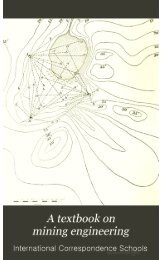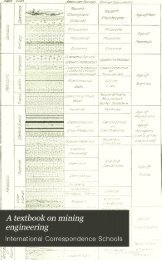- Page 1: nyplbeseabchubrab.es 3 3433 0795453
- Page 7 and 8: ^J
- Page 9 and 10: : THE LIGHT OF BRITANNIA THE Myster
- Page 11 and 12: THE \ I / WOKD. O DEDICATIO:^. XCln
- Page 13: DEDICATION. done at night. As if pr
- Page 16 and 17: — ii. SYNOPSIS. ^ CHAPTER Mound g
- Page 18 and 19: — iv. «vN()r-si.s. CHAPTER XV. A
- Page 21 and 22: TO THE READER. TlN" sending forth t
- Page 25 and 26: THE LICxHT OF BRITANNIA, CHAPTER T.
- Page 27 and 28: THE LIGHT OF BRITANNIA. 3 Hebrews,
- Page 29 and 30: THE LIGHT OF BRITANNIA. 5 sacred pe
- Page 31 and 32: THE LIGHT OF BRITANNIA. 7 iug his m
- Page 33 and 34: — THE LIGHT OF BRITANNIA. 9 the C
- Page 35 and 36: THE LIGHT OF BRITANNIA. 11 and the
- Page 37 and 38: THE LIGHT OF BKITAKNIA. 13 TCow, th
- Page 39 and 40: THE LIGHT OF BRITANNIA. 15 drops hi
- Page 41 and 42: THE LIGHT OF BRITANNIA. 17 Humidity
- Page 43 and 44: THE LIGHT OF BRITANNIA. 19 to the l
- Page 45 and 46: THE LIGHT OF BRITANNIA. 21 by the D
- Page 47: — THE LIGHT OF BRITANNIA. 23 Deli
- Page 51 and 52: ! —; THE LIGHT OF BRITANNIA. 27 v
- Page 53 and 54: ; THE LIGHT OF BRITANNIA. 29 in the
- Page 55 and 56: THE LIGHT OF BRITANNIA. 31 of Venus
- Page 57 and 58: THE LIGHT OF BRITANNIA. 33 hold, em
- Page 59 and 60: with the feet towards the east, THE
- Page 61 and 62: THE LIGHT OF BRITANNIA. 37 Devil ex
- Page 63 and 64: — THE LIGHT OF BRITANNIA. 39 the
- Page 65 and 66: THE LIGHT OF BRITANNIA. 41 Holies t
- Page 67 and 68: THE LIGHT OF BRITANNIA. 43 bolised
- Page 69 and 70: THE LIGHT OF BRITANNtA. 45 name for
- Page 71 and 72: — ^ : THE LIGHT OF BRITANNIA. 47
- Page 73 and 74: THE LIGHT OP BRITANNIA. 49 Mountain
- Page 75 and 76: THE LIGnT OF BRITANNIA. 51 to as th
- Page 77 and 78: — ; THE LIGHT OF BRITANNIA. 53 de
- Page 79 and 80: — THE LIGHT OF BRITANNIA. 55 gods
- Page 81 and 82: THE LIGHT OF BRITANNIA. 57 to have
- Page 83 and 84: THE LIGHT OF BRITANNIA. 59 of the C
- Page 85 and 86: — THE LIGHT OF BRITANNIA. 01 resc
- Page 87 and 88: THE LIGHT OF BRITANNIA. 63 to invit
- Page 89 and 90: THE LIGHT OF BRITANNIA. 65 " the bi
- Page 91 and 92: — , THE LIGHT OF BRITANNIA. 67 Th
- Page 93 and 94: THE LIGHT OF BRITANNIA. 69 Miriam,
- Page 95 and 96: — THE LIGHT OF BRITANNIA. 71 In E
- Page 97 and 98: TflE LIGHT OP BRITANNIA. 73 The sac
- Page 99 and 100:
DHE light of BRITANNIA. 75 original
- Page 101 and 102:
THE LIGHT OF BRITANNIA. 77 Paganism
- Page 103 and 104:
THE LIGHT OF BRITANNIA. 79 It shoul
- Page 105 and 106:
— THE LIGHT OF BRITxVNNIA. 81 whe
- Page 107 and 108:
—; THE LIGHT OF BRITANNIA. 83 sol
- Page 109 and 110:
THE LIGHT OF BRITANNIA. 85 in the n
- Page 111 and 112:
THE LIGHT 0^ BRITANNIA. 87 Osiris (
- Page 113 and 114:
TfiE tlGHT OF BRITANNIA. 89 same fi
- Page 115 and 116:
— — THE LIGHT OF BRITANNIA. 91
- Page 117 and 118:
— — — singing the while a lon
- Page 119 and 120:
— THE LIGHT OF BRITANNIA. 95 to t
- Page 121 and 122:
— ; THE LIGHT OP BRITANNIA. 97 Br
- Page 123 and 124:
' A — ; —; ; — — — ; THE
- Page 125 and 126:
— - — THE LIGHT OF BRITANNIA. 1
- Page 127 and 128:
; — THE LIGHT OF BRITANNIA. 103 a
- Page 129 and 130:
— THE LIGHT OF BRITANNIA. 105 gon
- Page 131 and 132:
THE LIGHT OF BRITANNIA. 107 still g
- Page 133 and 134:
— THE LIGHT OF BRITANNIA. 109 Egy
- Page 135 and 136:
THE LIGHT OF BRITANNIA. Ill set on
- Page 137 and 138:
THE LIGHT OF BRITANNIA. 113 in its
- Page 139 and 140:
— THE LIGHT OF BRITANNIA. 115 all
- Page 141 and 142:
— *IEE LIGHT OF BRITANNIA. 117 Bo
- Page 143 and 144:
THE LIGHT OF BRITANNIA. 119 Archer
- Page 145 and 146:
— THE LIGHT OP BRITANNIA. 121 on
- Page 147 and 148:
THE LIGHT OF BRITANNIA. 123 the Zod
- Page 149 and 150:
— , . THE LIGHT OF BRITANNIA. 125
- Page 151 and 152:
THE LIGHT OF BRITANNIA. l27 after h
- Page 153 and 154:
! THE LIGHT OF BRITANNIA. 129 Engli
- Page 155 and 156:
THE LIGHT OF BRITANNIA. 131 " Then
- Page 157 and 158:
! The light of beitannia. 133 both
- Page 159 and 160:
THE LIGHT OF BRITANNIA. 135 tempora
- Page 161 and 162:
"'' THE LIGHT OF BEITANNlA. 137 CHA
- Page 163 and 164:
THE LIGHT OF BRITANNIA. 139 It will
- Page 165 and 166:
THE LIGHT OF BRITANNIA. 141 (St. Ge
- Page 167 and 168:
THE LIGHT OF BRITANNIA. 143 was fei
- Page 169 and 170:
— THE LIGHT OF BRITANNIA. 145 pit
- Page 171 and 172:
THE LIGHT OF BRITANNIA. 147 CHAPTER
- Page 173 and 174:
THE LIGHT OF BRITANNIA. 149 ill the
- Page 175 and 176:
THE T.TCnT OF BTJTTAXNTA. 1-^)1 by
- Page 177 and 178:
THE LIGHT OF BRITANNIA. 153 thoufrl
- Page 179 and 180:
TFIE LIGHT OF BRITANNfA. 155 CHAPTE
- Page 181 and 182:
THE Lir.nT of Britannia. 157 tude,
- Page 183 and 184:
; THE LIGHT OF BRITANNIA. lo9 entir
- Page 185 and 186:
: THE LIGHT OF BRITANNIA. 161 descr
- Page 187 and 188:
THE LIGHT OF BRITANNIA. 163 On the
- Page 189 and 190:
THE LIGHT OF BRITANNIA. 165 Now the
- Page 191 and 192:
— — THE LIGHT OF BRITANNIA. 167
- Page 193 and 194:
• THE LIGHT OF BRITANNIA. 169 Rou
- Page 195 and 196:
— THE LIGHT OF BRITANNIA. 171 by
- Page 197 and 198:
THE LIGHT OF BRITANNIA. 173 stone;
- Page 199 and 200:
THE LIGHT OF BRITANNIA. 175 foimd t
- Page 201 and 202:
THE LIGHT OF BRITANNIA. 177 alone,
- Page 203 and 204:
THE LIGHT OF BRITANNIA. 179 winter
- Page 205 and 206:
;; THE LIGHT OF BRITANNIA. 181 whit
- Page 207 and 208:
THE LIGHT OF BRITANNIA. 183 states
- Page 209 and 210:
— THE LICxHT OF BRITANNIA. 185 Gr
- Page 211 and 212:
THE LIGHT OP BRITANNIA. 1S7 opposit
- Page 213 and 214:
THE LIGHT OF BRITANNIA. 189 comeet
- Page 215 and 216:
THE LIGHT OF BRITANNIA. 191 there h
- Page 217 and 218:
THE LIGHT OP BRITANNIA. 193 Trinity
- Page 219 and 220:
— ; THE LIGHT OF BRITANNIA. 195 W
- Page 221 and 222:
, THE LIGHT OF BRITANNIA. 197 sprin
- Page 223 and 224:
^ — THE LIGHT OF BRITANNIA. 199 G
- Page 225 and 226:
— Ketos), and restored i)i THE LI
- Page 227 and 228:
THE LIGHT OF BRITANNIA. 203 ^inal -
- Page 229 and 230:
— THE LIGHT OP BRITANNIA. 205 Sem
- Page 231 and 232:
THE LIGHT OF BRITANNIA. 207 CHAPTER
- Page 233 and 234:
THE LIGHT OF BRITANNIA. 309 We now
- Page 235 and 236:
THE LIGHT OF BRITANNIA. 211 We now
- Page 237 and 238:
THE LIGHT OF BRITANNIA. 213 be an o
- Page 239 and 240:
THE LIGHT OF BRITANNIA. 215 curtain
- Page 241 and 242:
; THE LIGHT OF ERITANNIA. 217 the b
- Page 243 and 244:
— THE LIGHT OF BRITANNIA. 219 sta
- Page 245 and 246:
names were engraved in the THE LIGH
- Page 247 and 248:
&c. THE LIGHT OF BRITANNIA. 225 Thi
- Page 249 and 250:
THE LIGHT OF BRITANNIA. 225 CHAPTER
- Page 251 and 252:
THE LIGHT OF BRITANNIA. 227 As we m
- Page 253 and 254:
THE LIGHT OF BRITANNIA. 229 And it
- Page 255 and 256:
THE LIGHT OF BRITANNIA. 231 After t
- Page 257 and 258:
— THE LIGHT OF BRITANNIA. 233 Sun
- Page 259 and 260:
THE LIGHT OF BRITANNIA. 235 buried
- Page 261 and 262:
ux THE LIGHT OF BRITANNIA. 237 isin
- Page 263 and 264:
THE LIGHT OF BRITANNIA. 239 CHAPTER
- Page 265 and 266:
THE LIGHT OF BRITANNIA. 241 particn
- Page 267 and 268:
THE LIGHT OF BRITANNIA. 243 The Dru
- Page 269 and 270:
THE LIGHT OF BRITANNIA. 245 before,
- Page 271 and 272:
; THE LIGHT OF BRITANNIA. 247 the c
- Page 273 and 274:
; THE LIGHT OF BRITANNIA. 249 them
- Page 275 and 276:
THE LIGHT OF BRITANNIA. 251 TABLE O
- Page 277 and 278:
— TPIE LIGHT OF BRITANNIA. 253 to
- Page 279 and 280:
^ THE LIGHT OF BRITANNIA. 255 Jelio
- Page 281 and 282:
— THE LIGHT OF BRITANNIA. 257 ate
- Page 283 and 284:
THE LIGHT OF BRITANNIA. 259 charact
- Page 285 and 286:
— THE LIGHT OF BRITANNIA. 261 (th
- Page 287 and 288:
THE LIGHT OF BRITANNIA. 263 in bis
- Page 289 and 290:
THE LIGHT OF BRITANNIA. 265 All thi
- Page 291 and 292:
THE IJGHT OF BRITANNIA. 267 titles
- Page 293 and 294:
THE LIGHT OF BlllTAXNIA. 269 CHAPTE
- Page 295 and 296:
THE LIGHT OF BRITANNIA. 271 used a
- Page 297 and 298:
; ; THE LIGHT OF BRITANNIA. 273 Obs
- Page 299 and 300:
THE LIGHT OP BRITANNIA. 275 Father,
- Page 301 and 302:
— THE LIGHT OF BRITANNIA. 277 To
- Page 303 and 304:
THE LIGHT OF BRITANNIA. 279 Now, ob
- Page 305 and 306:
— THE LIGHT OF BRITANNIA. 281 APP
- Page 307 and 308:
THE LIGHT OF BRITANNIA. 283 who are
- Page 309 and 310:
— — THE LIGHT OF BRITANNIA. 285
- Page 311 and 312:
THE LIGHT OF BIJITANNIA. 287 Englan
- Page 313 and 314:
THE LIGHT OF BRITANNIA. 289 There i
- Page 315 and 316:
THE LIGHT OF BRITANNIA. 291 CHAPTER
- Page 317 and 318:
THE LIGHT OF BRITANNIA. 293 the one
- Page 319 and 320:
— — — — THE LIGHT OF BRITAN
- Page 321 and 322:
THE LIGHT OF BRITANNIA. 207 Taking
- Page 323 and 324:
THE LIGHT OF BRITANNIA. 209 CHAPTER
- Page 325 and 326:
THE LIGHT OF BRITANNIA. 301 from th
- Page 327 and 328:
' The — THE LIGFTT OF BRITANNIA.
- Page 329 and 330:
THE LIGHT OF BRITANNIA. 305 White,
- Page 331 and 332:
TOE LIGHT OF BRITANNIA. 307 nourish
- Page 333 and 334:
— ; THE LIGHT OF BRITANNIA. 309 l
- Page 335 and 336:
THE LIGHT OP IIRITANNIA. 311 of tli
- Page 337 and 338:
THE LIGHT OF BRITANNIA. 313 otlierw
- Page 339 and 340:
THE LIGHT OF BRITANNIA. 315 used by
- Page 341 and 342:
THE LIGHT OF BRITANNIA. 317 find lo
- Page 343 and 344:
THE LIGHT OF BRITANNIA. 319 Divinit
- Page 345 and 346:
—" THE LIGHT OF BRITANNIA. 321 pl
- Page 347 and 348:
THE LIGHT OF EEITANNIA. 323 times o
- Page 349 and 350:
THE LIGHT OF BRITANNIA. 325 CHAPTER
- Page 351 and 352:
THE LIGHT OF nEITANNIA. 327 linsban
- Page 353 and 354:
THE LIGHT OF BRITANNIA. 320 then ex
- Page 355 and 356:
THE LIGHT OF BPtTTAKNIA. 831 "Cjsga
- Page 357 and 358:
THE LIGHT OF BRITANNIA. 333 At the
- Page 359 and 360:
— — ; — — — THE LIGHT OF
- Page 361 and 362:
THE LIGHT OF BKITANNIA. 33: CHAPTER
- Page 363 and 364:
THE LIGHT OF BRITANNIA. 339 Strange
- Page 365 and 366:
THE LIGHT OF BRITANXIA. 341 St. Mat
- Page 367 and 368:
THE LIGHT OF ERITANNIA. 343 we find
- Page 369 and 370:
THE LIGHT OF BRITANNIA. 345 of the
- Page 371 and 372:
THE LIGHT OF BRITANNIA. 347 with th
- Page 373 and 374:
THE LIGHT OF BRITANNIA. 349 the old
- Page 375 and 376:
. THE LIGHT OF BRITANNIA. 351 perso
- Page 377 and 378:
A V E. S U HY THE GOLGOTHA OF AvEBU
- Page 379 and 380:
TPIE LIGHT OF BRITANNIA. 353 moat,
- Page 381 and 382:
THE LIGHT OF BRITANNIA. 355 '' Sir,
- Page 383 and 384:
THE LIGHT OF BRITANNIA. 357 counten
- Page 385 and 386:
! THE LIGHT OF BRITANNIA. 350 ancie
- Page 387 and 388:
—; THE LK4HT OF BRITANNIA. 361 Th
- Page 389 and 390:
— THE LIGHT OF BRITANNIA. 363 ben
- Page 391 and 392:
; THE LlCnX OF BRITANNIA. 3C5 noon)
- Page 393 and 394:
THE LIGHT OF BRITANNIA. 367 Eden, n
- Page 395 and 396:
— THE LIGHT OF BKITANNIA. 369 fir
- Page 397 and 398:
— THE LIGHT OF BRITANNIA. 371 and
- Page 399 and 400:
THE LIGHT OF BRITANNIA. 373 ''Adda"
- Page 401 and 402:
THE LIGHT OF BRITANNIA. 375 zontal
- Page 403 and 404:
THE LIGHT OF BRITANNIA. 377 to this
- Page 405 and 406:
THE LIGHT OF BRITANNIA. 379 This is
- Page 407 and 408:
THE LIGHT OF BRITANNIA. 381 discipl
- Page 409 and 410:
— THE LIGHT OF BRITANNIA. 383 and
- Page 411 and 412:
— THE LIGHT OF BRITANNIA. 385 ser
- Page 413 and 414:
— THE LIGHT CF BPaTANNIA. 6oi by
- Page 415 and 416:
THE LIGHT OF BRITANNIA. 389 As stat
- Page 417 and 418:
THE LIGHT OF BRITANNIA. 391 CHAPTER
- Page 419 and 420:
—; THE LIGHT OF BRITANNIA. 393 In
- Page 421 and 422:
THE LIGHT OF BRITANNIA. 305 sun in
- Page 423 and 424:
THE LIGHT OF BRITANNIA. 397 bees st
- Page 425 and 426:
THE LIGHT OF BRITANNIA. 390 BUTTERF
- Page 427 and 428:
THE LIGHT OF BRITANNIA. 401 CHAPTER
- Page 429 and 430:
THE LIGHT OF BRITANNIA. 403 Now, th
- Page 431 and 432:
THE LIGHT OF BRITANNIA. 405 of the
- Page 433 and 434:
THE LIGHT OF BRITANNIA. 407 assembl
- Page 435 and 436:
— THE LIGHT OF BRITANNIA. 409 Sun
- Page 437 and 438:
THE LIGHT OF BRITANNIA. 411 Now ''A
- Page 439 and 440:
THE LIGHT OF BRITANNIA. 413 It T\'a
- Page 441 and 442:
THE LIGHT OF BRITANNIA. 415 nouiice
- Page 443 and 444:
— THE LIGHT OF BRITANNIA. 417 nor
- Page 445 and 446:
— ^ THE LIGHT OF BRITANNIA. 419 s
- Page 447 and 448:
y — THE LIGHT OF BRITANNIA. 421 T
- Page 449 and 450:
• On ! THE LIGHT OF BRITANNIA. 42
- Page 451 and 452:
the letters of the THE LIGHT OF BRI
- Page 453 and 454:
THE LIGHT OF BRITANNIA. 427 " Where
- Page 455 and 456:
the light of britannia. 429 Barry I
- Page 457:
— AX OM) DRUTDIC BOOK, CALLED " P


















